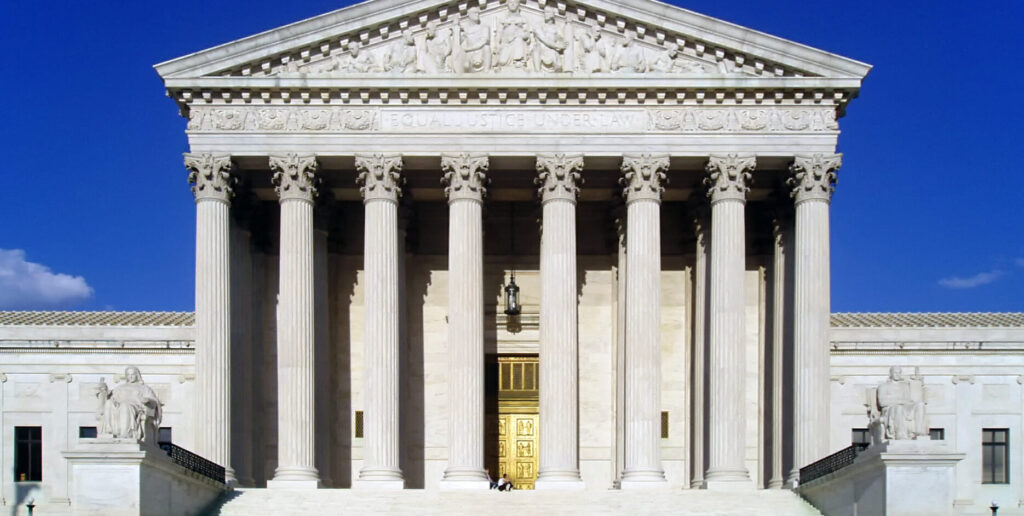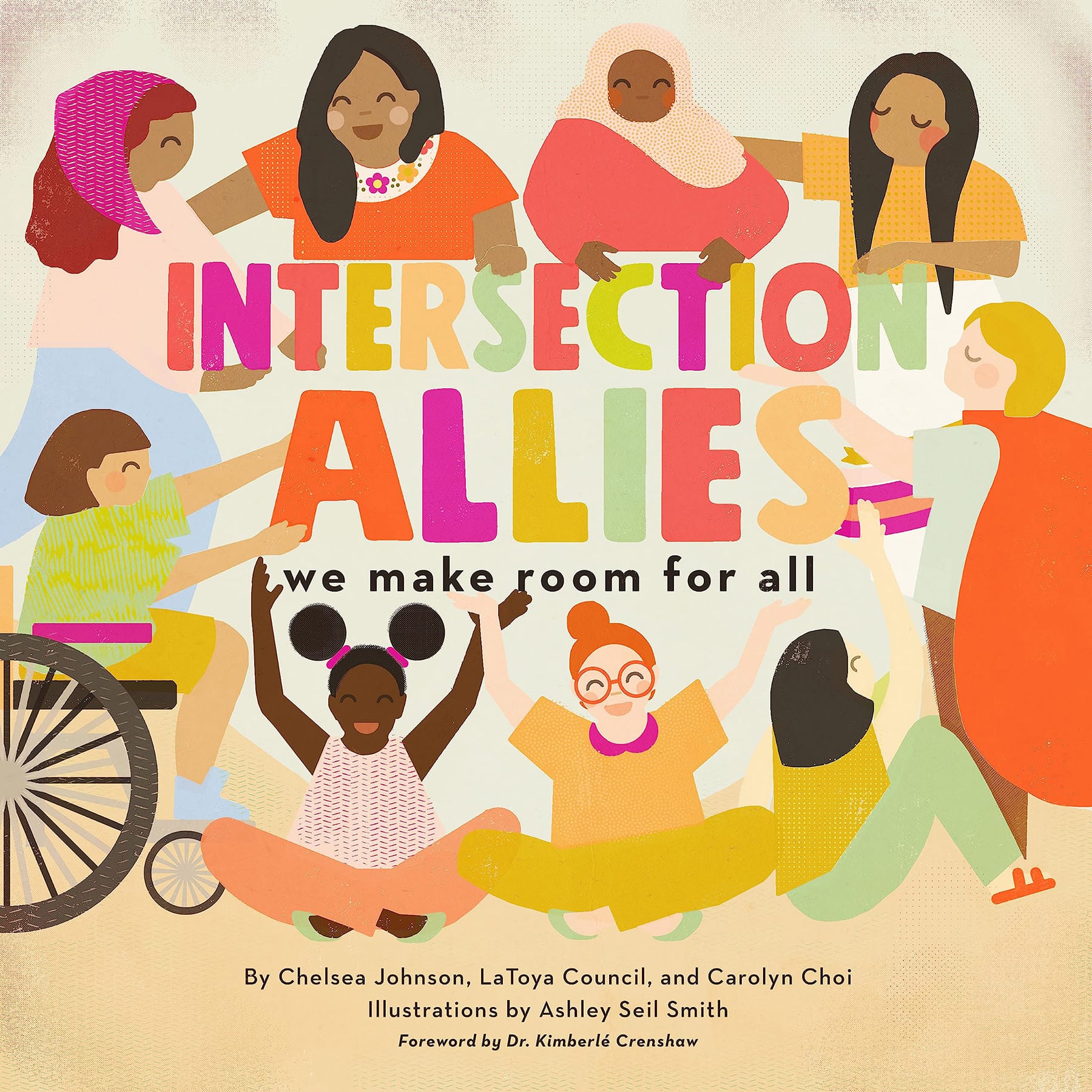The Supreme Court of the United States is scheduled to hear oral arguments in Mahmoud v. Taylor on Tuesday, April 22, 2025.
Mahmoud v. Taylor is about a small number of LGBTQ-inclusive children’s books included in the classrooms of Montgomery County (Maryland) Public Schools. The books were chosen and evaluated by education professionals. Six parents (three couples) sued the school district board of education claiming their religious freedom was violated by not having an option to opt out their children from classrooms where the books might be part of curriculum, including when offered as nonmandatory supplemental learning materials.
Context to know and report:
- In 2022, Montgomery County Public Schools (MCPS) in Maryland expanded their curriculum book collection with nine inclusive picture books for children. An MCPS committee selected the titles and completed the necessary evaluation forms, which were then reviewed by a content supervisor, according to district protocol.
- The school board stated in legal filings, “the books are made available for individual reading, classroom read-alouds, and other educational activities designed to foster and enhance literacy skills.
- A district official said the books were to be integrated “into the curriculum in the same way that other books are used, namely, to put them on a shelf for students to find on their own; to recommend a book to a student who would enjoy it; to offer the books as an option for literature circles, book clubs, or paired reading groups; or to use them as a read aloud.”

- The district’s communications director, Jessica Baxter, said the books tell “joyful stories of folks who happen to be part of the LGBTQ+ community,” and that they “celebrate and positively portray LGBTQ+ identities.”
- Three couples filed a lawsuit against MCPS in 2023, objecting to the books and claiming the district infringed on their religious rights by not allowing them to opt out their children from potential exposure to the books.
- The plaintiffs are represented by Becket, formerly known as Becket Fund for Religious Liberty, a legal group with an anti-LGBTQ history that includes representing a school that fired a 15-year veteran teacher for being gay and marrying her partner of 25 years. Southern Poverty Law Center describes Becket as a “hardline” group that promotes legislation and lawsuits to justify anti-gay discrimination. Becket has also vigorously pursued banning access to abortion and access to contraception.
- People of faith support LGBTQ people and equality, and LGBTQ people are also people of faith. 67% of adult Americans say being LGBTQ should be accepted by society, including 59% of religiously-affiliated adults.
- Two-thirds of U.S. Catholics, Protestants and other Christians oppose using religious beliefs as an excuse to discriminate against LGBTQ people.
- UCLA’s Williams Institute: 2.6 million LGBTQ adults are raising children under age 18.
24% of all LGBTQ parents live in the Northeast U.S., which encompasses Maryland. 31% live in the U.S. South. Approximately 5 million children in the U.S. are being raised by an LGBTQ parent. 20% of LGBTQ people in Maryland are raising children.
- PEN America has documented more than 16,000 book bans in public schools nationwide since 2021, predominantly targeting books by and about LGBTQ people and books about people of color and race and racism. In its latest report Cover to Cover in February, the organization found 29% of all banned titles during the 2023-2024 school year featured LGBTQ+ characters, people, or themes.
- PEN America has tracked tactics used to ban books across the country. Religious freedom arguments are the latest way to try to get books, especially with LGBTQ themes and characters, banned. Mahmoud v. Taylor has the potential to dramatically escalate book bans across the country by giving legal cover to discriminatory censorship, particularly targeting LGBTQ narratives.

- The American Library Association (ALA) tracked 414 book ban attempts against public school and library materials, encompassing 1,128 unique titles, in the first eight months of 2024.
- The U.S. Supreme Court agreed to hear the plaintiffs’ appeal after their requests to force the school district to provide opt outs while the case was being litigated lost in both the lower federal trial and appellate court. Federal Court of Appeals Judge Steven Agee noted there was no “evidentiary link showing that the Storybooks are being implemented in a way that directly or indirectly coerces the Parents or their children to believe or act contrary to their religious faith.”
- The Supreme Court reached out to take this case at a very early stage and potentially decide it on a group of parents’ claims despite the fact that the case had not yet proceeded to the point where there was a record of how the books were actually being used in the classroom.
- The authors and illustrators of books at issue in this lawsuit issued a statement in support of inclusive books: “We stand in support of the Montgomery County School District. We oppose censoring or segregating books, like ours, that feature LGBTQ+ people. All families deserve to be seen and heard. To act otherwise is harmful and sends a devastating message to students: that their lives and families are so offensive and dangerous that they can’t even be discussed in school.”
- The books include the picture book Uncle Bobby’s Wedding, a celebration of family featuring a girl who finds that her favorite uncle’s marriage means she’s gaining another uncle, not losing one. The book was selected as a best picture book honoree by Kirkus Reviews. Author Sarah Brannen told Mombian’s Dana Rudolph: “Children need to see themselves in books. The books in the lawsuit need to be in the school and accessible to all the children in the school, without interference… we all know by now that banning books is the first step toward banning people.”

- The authors of Jacob’s Room to Choose (about making schools and restrooms safe for all children) wrote in Time: “We believe that people have a fundamental right to practice and express their faith, but not when it harms others. Allowing families to opt their children out of reading our books hurts the children whose lives and families are reflected in those books. “Opt-out” policies starkly communicate to classrooms of children that behaving decently to all human beings is optional and tells kids who are different that they and their families don’t merit the respect of all their classmates.”
- There has been prior precedent in the federal circuit courts ruling in favor of access to inclusive books. For example, in 2008, The U.S. Supreme Court declined to hear an appeal by two Lexington, Mass., couples, leaving in place a First Circuit Court of Appeals decision that, like four other federal circuit courts of appeals, held that participation in public school instruction cannot alone burden the right to free exercise of religion absent some “coercive effect.” The First Court held that merely exposing a child to ideas that conflict with the religious beliefs of their parents “does not inhibit the parent from instructing the child differently.”
- Opt-out policies are costly for taxpayers, student education, and schools: “The administrative burden of having to notify parents, collect their responses, answer any questions they may have about the material, and determine what the opted-out students will do during class time when the LGBTQ books are read may dissuade schools from including LGBTQ books in the first place.”

- Center for American Progress: Book bans “require tens of thousands of hours from teachers, librarians, and administrators to review the books and implement a system of censorship—all at a time when school resources are already stretched thin, and states across the country are facing teacher and staff shortages.”
- First Book Research & Insights: A poll of 1,500 teachers and librarians revealed “book bans are negatively impacting their ability to teach,” undermine their expertise, and “contribute to a sense of erasing people and history.” Of the respondents, “72 percent noted that when students’ access to books is restricted, their reading engagement declines.”
- EveryLibrary Institute: Polling and surveys reveal “a significant majority of the public opposes book bans, with a substantial majority of voters in some surveys supporting state legislation to protect individuals’ rights to read freely. Some surveys show that as many as three-quarters of voters believe that ensuring people have access to diverse books is essential. More than half of Americans appear to feel that book bans infringe on their right to make decisions for their children.”
ADDITIONAL RESOURCES
- GLAAD offers the Book Bans: A Guide for Community Response and Action toolkit to inform the public about book challenges. This resource includes guidance on ways to organize, engage with the media, and prepare for public hearings.
- The American Library Association (ALA) website features a banned books portal to share their research and data on book bans, spotlight each year’s most challenged books, and offer book résumés to help people in their efforts to defend the right to read.
- PEN America tracks book bans in schools throughout the country and shares their findings in a report. Banned in the USA: Beyond the Shelves details the efforts to remove books from school libraries, shows where book challenges are occurring, and explores the subject matter of censored titles. PEN America’s Index of School Book Bans lists books banned in the 2023-24 school year.
The National Coalition Against Censorship’s Youth Censorship Database of K–12 student censorship incidents includes book challenges in schools and libraries, as well as censorship of student art, journalism, and other types of student expression in schools.
Efforts to censor can be reported at The National Coalition Against Censorship (NCAC)’s Report Censorship page and through the ALA’s Challenge Reporting page.
Your Support Matters
We have been working hard for over 40 years on accelerating LGBTQ acceptance and continue to address the gaps with advocacy. During these difficult times, with your support, we can continue the fight for many more years to come. Join us!


















